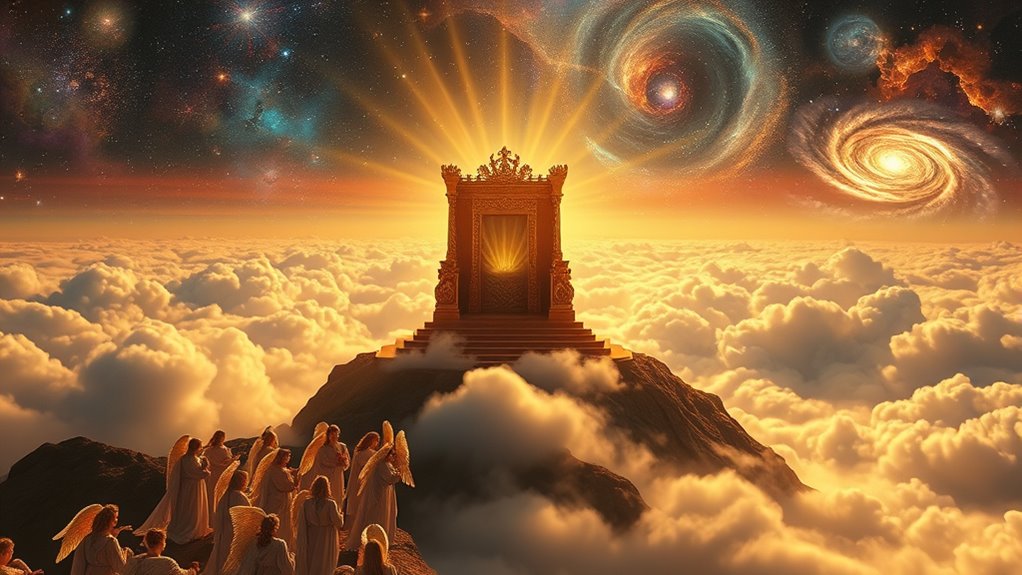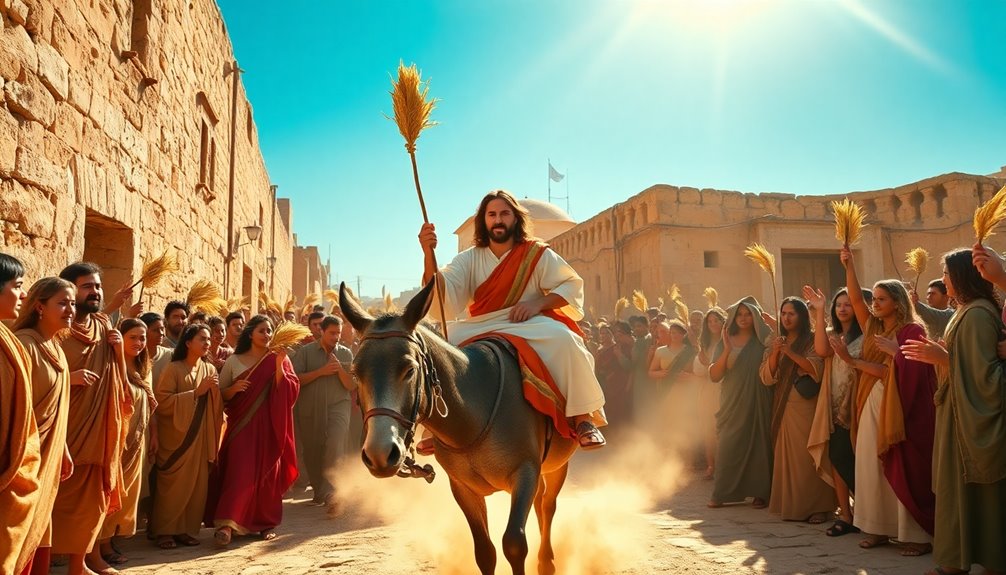The debate over the millennium focuses on whether Christ’s 1,000-year reign in Revelation 20 is a literal future event or a symbolic spiritual period. Some believe it’s a future, physical reign on Earth, while others see it as representing the ongoing spiritual rule of the church. Understanding these perspectives helps clarify biblical prophecy and its relevance today. If you explore further, you’ll gain a deeper grasp of the key arguments and implications behind this important eschatological discussion.
Key Takeaways
- The debate centers on whether the millennium is a literal 1,000-year earthly reign or a symbolic spiritual period.
- Premillennialism advocates for a future, physical reign of Christ on earth, while amillennialism sees it as ongoing spiritual rule.
- Interpretations vary between a literal future event and symbolic representations of divine completeness.
- The role of Israel and prophetic fulfillment significantly influence differing views on the millennium.
- Understanding these perspectives impacts eschatological expectations and the interpretation of biblical end-times prophecies.
Biblical Foundations for the Millennium

Have you ever wondered what the Bible says about the idea of a thousand-year reign of Christ? The concept is rooted in eschatological symbolism found in Revelation 20:1-6, where a thousand years symbolizes a divine period of peace and righteousness. This imagery reflects covenant promises God made to His people, emphasizing His commitment to restore and rule with justice. Throughout Scripture, the number thousand highlights completeness and divine authority, reinforcing the idea that Christ’s reign is both promised and divinely sanctioned. These biblical foundations serve as the basis for understanding the millennium as a future fulfillment of God’s covenant promises, pointing to a time when Christ will establish a righteous, everlasting kingdom on earth. The use of the number thousand throughout Scripture underscores the idea of divine sovereignty and eschatological symbolism, which affirm the certainty of this divine reign. Additionally, many theologians interpret this symbolism as representing an ultimate divine victory, further solidifying its significance in biblical prophecy. The symbolism of the number thousand also emphasizes the divine completeness and the totality of Christ’s reign, which is central to biblical eschatology.
Interpretations of Revelation 20
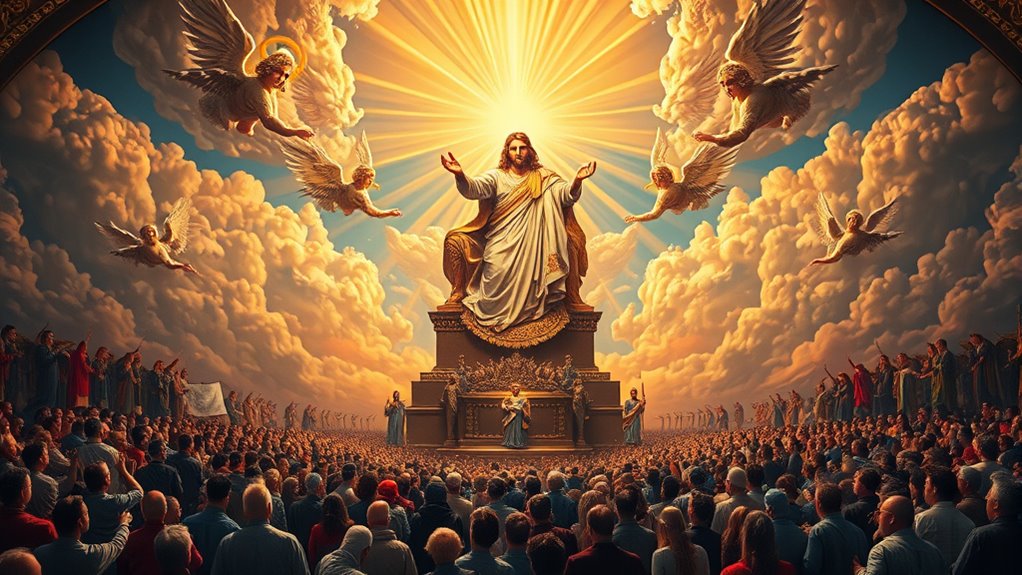
Revelation 20 has sparked diverse interpretations among theologians and scholars, each offering a unique perspective on the nature and timing of Christ’s thousand-year reign. Some see it as a literal future event, while others view it as symbolic language representing spiritual truths. Many interpret the chapter through the lens of prophetic symbolism, emphasizing its allegorical meaning rather than a strict chronological timeline. Your understanding may include these ideas:
- A literal 1,000-year reign on earth
- A symbolic period representing the church age
- An allegory of Christ’s ongoing spiritual rule
- A future divine intervention yet to come
- A combination of literal and symbolic elements
These varying interpretations are influenced by prophetic symbolism and how different traditions approach biblical prophecy, shaping your grasp of eschatology. Recognizing the role of Gold IRA rules and regulations can also inform your understanding of complex prophetic imagery, highlighting the importance of precise interpretation within biblical studies. Additionally, understanding the millennium involves exploring both historical and contemporary theological debates that continue to evolve, including the significance of biblical prophecy in shaping these views. Furthermore, some scholars emphasize the importance of understanding the contemporary context in which these visions were written to better interpret their meaning for today.
Literal vs. Symbolic Reign: Key Debates
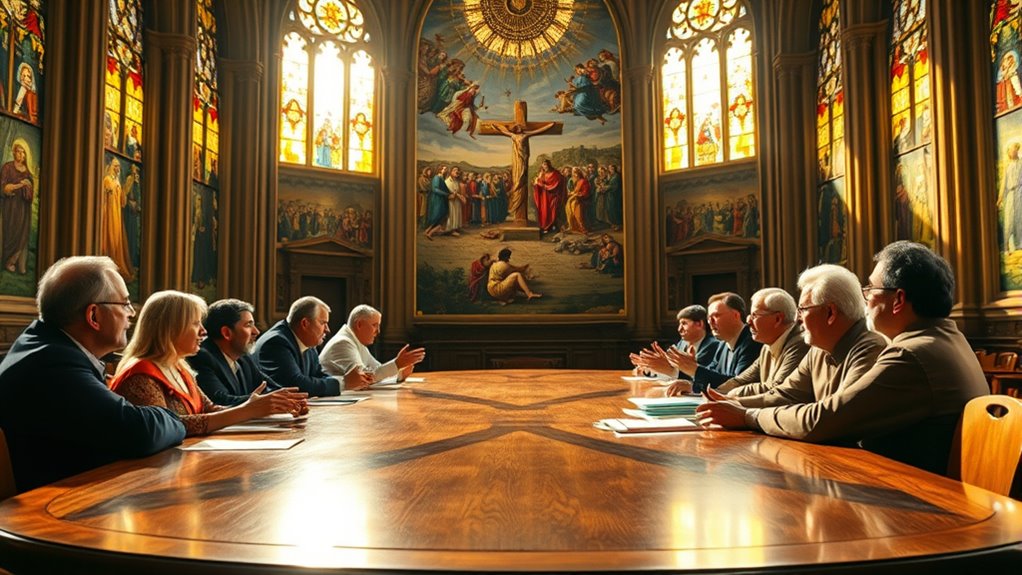
The interpretation of Revelation 20’s thousand-year reign hinges on whether you see it as a literal period or a symbolic representation. If you favor a literal interpretation, you believe the reign is a concrete 1,000-year future event when Christ physically rules on Earth. Conversely, a symbolic symbolism approach views the thousand years as a metaphor for a spiritual or ongoing divine era, emphasizing broader themes rather than specific dates. Proponents of literal interpretation focus on the precise number, while supporters of symbolic symbolism interpret the number as representing completeness or divine perfection. Your view shapes how you understand biblical prophecy and the nature of Christ’s reign, whether as an actual future event or a spiritual reality that transcends specific timeframes. Understanding different interpretative approaches helps clarify how biblical prophecies are applied to contemporary eschatology.
Theological Perspectives Across Denominations

Different Christian denominations interpret the thousand-year reign differently based on their theological frameworks. These eschatology debates often center around whether the reign is literal or symbolic. Some hold a premillennial view, expecting a literal 1,000-year period of Christ’s earthly rule. Others see it as a symbolic interpretation, representing Christ’s spiritual reign throughout history. Dispensationalists emphasize a future, physical kingdom, while amillennialists view the reign as ongoing and spiritual. Key points include:
Christian views on the thousand-year reign vary from literal to symbolic interpretations.
- Literal interpretation of the millennium
- Symbolic interpretation of the reign
- Impact on eschatology debates
- Differing views on Christ’s return
- Influence of theological traditions
- Prophetic dreams can sometimes influence individuals’ interpretations of biblical prophecy, shaping their understanding of eschatological events. Understanding these perspectives often involves examining how different traditions interpret biblical prophecy and its fulfillment. Additionally, the context of eschatological symbolism can help clarify whether these visions are meant to be taken literally or metaphorically. Recognizing the historical development of these interpretations can also shed light on how theological perspectives have evolved over time. Furthermore, analyzing theological frameworks provides insight into why certain denominations interpret the millennium differently.
Historical Views on the Millennium

Throughout history, different groups have held distinct views on the millennium, shaping Christian thought in unique ways. You’ll find that Pre-Millennialists believe Christ’s reign will happen before the end of the age, while Post-Millennialists see it as occurring after a period of Christian dominance. Exploring these perspectives helps clarify how believers have understood this prophecy over the centuries. Additionally, some interpret the millennium symbolically, viewing it as a spiritual reign rather than a literal thousand-year period. The vibrational approach to spiritual beliefs emphasizes the importance of mindset and energy in manifesting these prophetic visions. Understanding the eschatological significance of the millennium can deepen one’s insight into its varied interpretations across different Christian traditions, especially considering the different theological frameworks that inform these views. Recent discussions on AI safety and technological risks have also influenced contemporary eschatological thought, prompting believers to consider the implications of future innovations.
Pre-Millennial Perspectives
Pre-millennial perspectives have historically emphasized the belief that Christ will return before establishing a literal thousand-year reign on earth. You see, this view anticipates a future period of spiritual renewal where Christ’s reign transforms society. It also suggests that this reign will considerably influence culture, aligning moral values with divine principles. Key ideas include:
- Christ’s second coming as a prerequisite for the millennium
- A literal, physical reign on earth
- The restoration of Israel as a central theme
- A focus on prophetic fulfillment
- The anticipation of a renewed, godly society
This perspective underscores the belief that Christ’s return will bring about a profound transformation, shaping both spiritual life and cultural influence during the millennium.
Post-Millennial Interpretations
Post-millennial interpretations view the millennium as a future era of gradual Christian influence and societal improvement, rather than a sudden event. You see this perspective as emphasizing the transformative power of the Gospel to shape culture over time. The cultural implications are significant, suggesting that Christianity’s values will increasingly influence laws, education, and social norms. Doctrinal debates often revolve around how much progress is achievable before Christ’s return, with some arguing it will be a largely peaceful, Christian-led society. This view encourages optimistic outlooks on history, emphasizing human agency in bringing about God’s kingdom on earth. It contrasts sharply with other interpretations, fostering discussions about the role of the church and society in fulfilling biblical prophecy.
The Role of Israel in the Prophecy
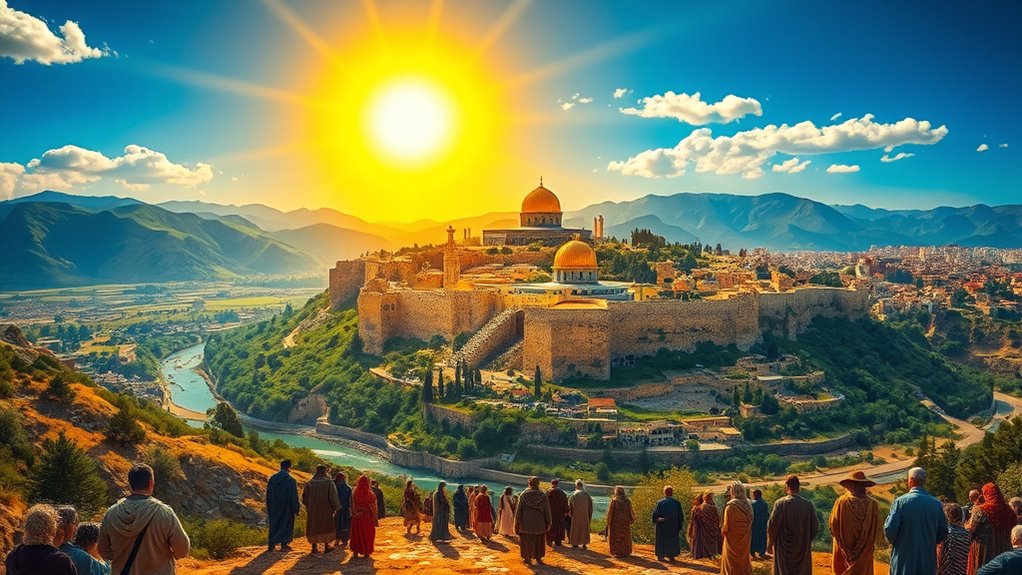
Israel plays a central role in biblical prophecy, serving as the focal point of God’s future plans for the world. Its prophetic significance signifies its special status in end-times events and the fulfillment of divine promises. As a nation state, Israel’s roles include:
- Restoring the land and people to fulfill biblical promises
- Serving as the center of global spiritual and political activity
- Acting as a catalyst for eschatological events
- Being a key player in the return of Christ
- Symbolizing God’s ongoing covenant with His people
- Recognizing the importance of tiny house resources in developing sustainable and flexible living arrangements for the future. The strategic location of Israel also amplifies its geopolitical significance, making it a pivotal player on the world stage. This significance underscores Israel’s role in biblical prophecy, highlighting its essential part in biblical eschatology. Additionally, Israel’s technological advancements contribute to its influence and strategic importance in contemporary geopolitics. These roles emphasize Israel’s unique position within prophecy, highlighting its essential part in biblical eschatology. Moreover, understanding the cultural and spiritual heritage of the region is vital, as it deeply influences Israel’s role in religious traditions and global faith communities.
Implications for Contemporary Christian Life

Your faith guides your moral choices and shapes how you live daily. Embracing hope and perseverance keeps you grounded amid challenges, knowing Christ’s reign offers ultimate justice. By aligning your life with these truths, you influence others and reflect God’s kingdom here and now. Recognizing the supernatural realm as part of God’s creation can deepen your understanding of these spiritual truths, reminding us that faith extends beyond the physical world and encompasses a spiritual dimension that influences our everyday lives.
Moral Guidance Impact
The belief in Christ’s 1,000-year reign offers profound moral guidance that shapes how you live today. It reminds you of your moral responsibility to uphold justice, kindness, and integrity. This conviction influences your ethical decision making, encouraging you to act with honesty and compassion. It also inspires you to serve others, promote peace, and resist temptations that conflict with your faith. By focusing on Christ’s reign, you’re motivated to reflect divine qualities in everyday actions. This belief fosters a sense of accountability for your choices, emphasizing that your conduct matters in the grand divine plan. Ultimately, it helps you align your life with core spiritual values, guiding you toward a more morally upright existence.
- Upholding justice and mercy
- Acting with integrity in daily life
- Prioritizing compassion over indifference
- Making ethical decisions rooted in faith
- Embracing moral responsibility actively
Ethical Living Standards
Believing in Christ’s 1,000-year reign shapes not only your moral outlook but also how you live out your faith through daily ethical standards. You’re called to practice spiritual discipline, strengthening your character through prayer, reflection, and intentional choices. This foundation encourages you to act justly, show kindness, and uphold integrity in all aspects of life. Engaging in community service becomes a tangible expression of your faith, demonstrating love and compassion to others. These actions reflect the divine order of Christ’s reign, emphasizing humility and service. By aligning your daily habits with these principles, you contribute to a community rooted in righteousness, embodying the ethical standards that prepare you for the fulfillment of Christ’s kingdom.
Hope and Perseverance
As believers look forward to Christ’s 1,000-year reign, hope becomes a essential anchor amid life’s uncertainties. This hope fuels your faith renewal and strengthens your spiritual endurance during challenging times. Maintaining perseverance means focusing on God’s promises, trusting in His timing, and staying committed despite setbacks. It reminds you that endurance is fundamental in living out your faith daily. To nurture hope and perseverance, consider these practices:
- Regular prayer and meditation on scripture
- Connecting with supportive Christian community
- Reflecting on God’s past faithfulness
- Setting spiritual goals for growth
- Reminding yourself of Christ’s ultimate victory
The Millennium in Modern Eschatology
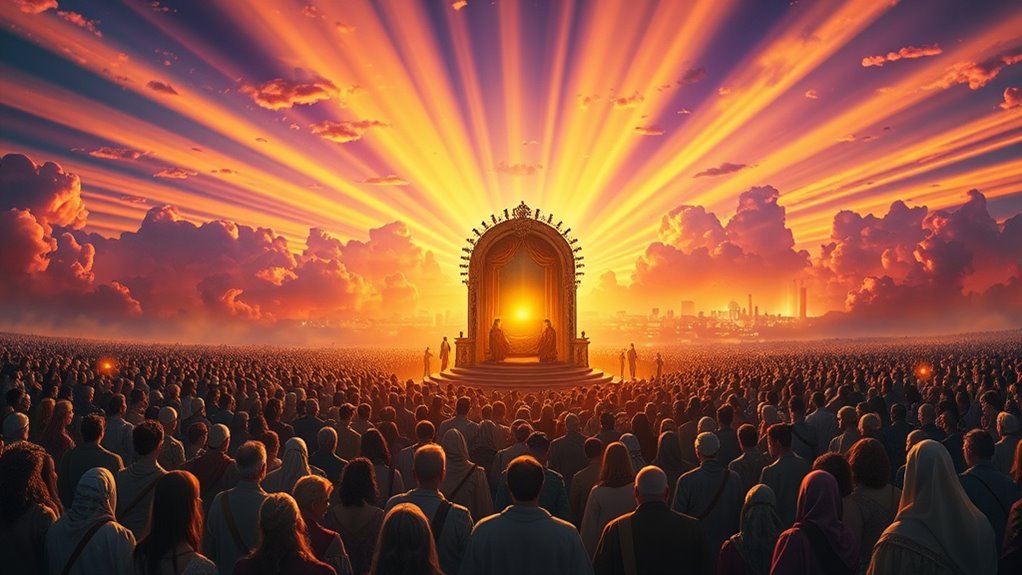
How do modern theologians interpret the concept of the Millennium? Many see it as either symbolic symbolism representing Christ’s spiritual reign or as a literal interpretation of a future 1,000-year period. Those favoring symbolism argue that the Millennium reflects God’s ongoing kingdom, emphasizing spiritual renewal rather than a physical timeline. Conversely, proponents of a literal interpretation believe the Bible predicts an actual future period when Christ will reign on earth, fulfilling specific prophetic promises. This debate influences contemporary eschatology, shaping how believers understand God’s plan. Some theologians blend both views, viewing the Millennium as a symbolic framework that also points to literal future fulfillment. Your perspective might depend on your approach to scripture—whether you see it as allegorical or predictive.
Future Scenarios and Interpretive Challenges
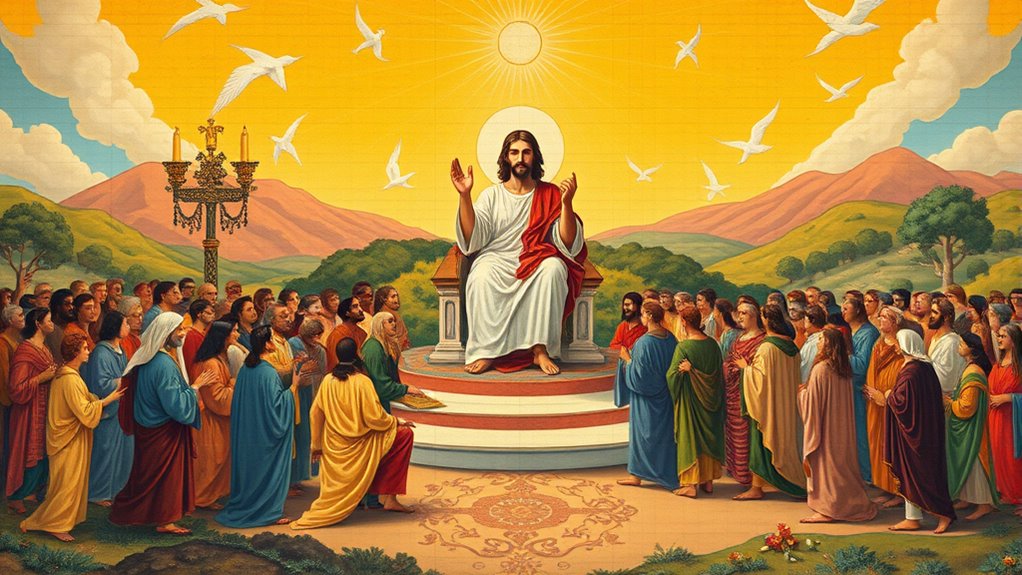
Future scenarios of the Millennium remain a central challenge for theologians and believers alike, as differing interpretive frameworks lead to varied expectations about what lies ahead. Some view the Millennium as a literal, future period of peace and spiritual renewal, while others see it as symbolic or already fulfilled. These interpretations often involve apocalyptic symbolism, shaping how you understand prophecy and God’s plan. Disagreements arise over whether the reign is literal or figurative, immediate or distant. You might consider debates on whether the Millennium signifies a future golden age or a present spiritual reality. Each perspective influences your expectations about the end times and God’s ultimate purpose. Clarifying these interpretive challenges helps you navigate the complex landscape of eschatology more confidently.
Understanding whether the Millennium is literal or symbolic shapes your view of end times.
- Literal vs. symbolic reign
- Future fulfillment vs. present reality
- Role of apocalyptic symbolism
- Emphasis on spiritual renewal
- Timing and sequence of events
Frequently Asked Questions
How Does the Millennium Influence Modern Christian Worship Practices?
You see, the idea of the millennium influences modern Christian worship through liturgical symbolism and worship renewal. Many churches incorporate symbols representing Christ’s reign, inspiring hope and anticipation. This focus encourages you to engage in worship that reflects the promise of Christ’s future rule, fostering spiritual renewal. As a result, your worship practices often emphasize themes of victory, peace, and divine sovereignty, connecting you more deeply to biblical prophecy and future hope.
What Are the Ecological Implications of a Literal Thousand-Year Reign?
You might consider that a literal thousand-year reign could bring ecological restoration, leading to healthier ecosystems and balanced wildlife populations. This period would emphasize environmental stewardship, encouraging humans to care for the earth proactively. Such a reign could serve as a model for sustainable living, inspiring efforts to heal environmental damage and promote harmony between humans and nature, ultimately ensuring the planet’s well-being for future generations.
How Do Non-Christian Religions Interpret the Concept of a Millennium?
You might think that non-Christian religions barely touch on millennial concepts, but many embrace grand visions of spiritual renewal and apocalyptic narratives. In Hinduism, the Yuga cycles foresee epochs of renewal, while Buddhism anticipates a future Buddha bringing enlightenment. These narratives symbolize profound transformation, often portraying a golden age or rebirth. Their interpretations of a millennium reflect hopes for cosmic renewal, transcending mere timeframes to embody ultimate spiritual awakening and societal harmony.
What Are the Political Consequences of Endorsing a Literal Millennium?
You might realize that endorsing a literal millennium can shift political authority by blending religious sovereignty with governance. This belief could lead to policies rooted in biblical prophecy, impacting laws and societal norms. Supporting a literal millennium may empower religious leaders, possibly reducing secular influence. Conversely, it risks fueling political conflicts between church and state, creating divisions and challenging the neutrality needed for inclusive governance.
How Does the Millennium Affect Christian Interfaith Dialogue Today?
Imagine you’re steering a world of faiths, like a modern-day Noah’s Ark, aiming for interfaith harmony. The millennium influences this by highlighting doctrinal differences, which can either unite or divide believers. You might find that focusing on shared hopes for peace helps bridge gaps, fostering respect and understanding. Embracing this eschatological concept encourages dialogue, reminding you that unity in diversity can lead to stronger interfaith relationships.
Conclusion
As you explore the debate over Christ’s 1,000-year reign, remember, it’s more than just ancient prophecy—it’s the blueprint for eternity itself! Your understanding could shape the very future of faith, hope, and divine victory. Don’t underestimate how this thousand-year vision could transform your life, your church, and the world. Embrace the mystery, and let this divine promise propel you into a future where victory knows no bounds!

